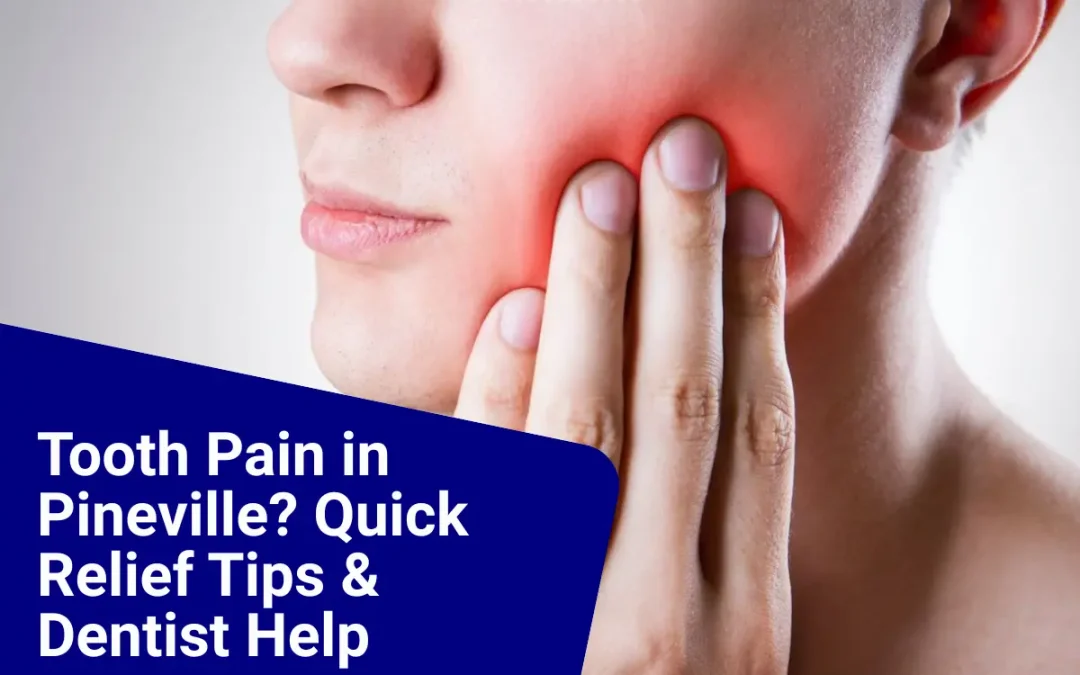Tooth Pain in Pineville? Here’s What to Do Before You See a Dentist
Tooth pain can happen without warning, and when it does, it can make everyday things like eating, sleeping, or even talking uncomfortable. If you’re in Pineville dental and feeling that familiar ache, don’t panic. There are simple steps you can take right now to feel better while you wait to see your dentist.
In this guide, we’ll point out some important actions you can take right away, along with what to avoid, before you visit a dentist. Knowing these tips can make a big difference in managing your pain.
Common Causes of Tooth Pain
When it comes to tooth pain, there is more than one reason behind it. From tooth decay to gum disease, which can affect overall health, there are many reasons.
So, here are some of the most common causes of tooth pain:
1. Cavities (Tooth Decay)
The first on the list is a very common reason: “cavity.” Cavities are small holes that form in your teeth due to tooth decay. They often start as mild sensitivity but can turn painful if left untreated. Once this pain starts, you are likely to feel a sharp pain when eating sweets or drinking something cold.
As the decay spreads, these holes can get bigger over time, reaching the sensitive inner part of your tooth. Cavities are one of the most common reasons people visit the dentist, and they’re usually easy to treat if caught early.
2. Gum Infection
Gum infections, also known as gingivitis or periodontitis, can make your gums red, swollen, and painful. Once the infection begins, you are likely to notice bleeding when brushing or flossing.
If left untreated, the infection can spread to the bone that supports your teeth. This can lead to loose teeth or even tooth loss. Pain from gum disease usually builds slowly over time
3. A Cracked or Broken Tooth
Sometimes, a tooth can crack or break, even from something as simple as biting down on a hard piece of food. This can also happen due to an injury, or in some cases, you might not even see the crack, but you’ll feel a sharp jolt when chewing.
When a tooth is cracked or broken, the inner layers become exposed and sensitive. You might feel sharp pain, especially when chewing or when your tooth is exposed to different temperatures.
4. Tooth Infection (Abscess)
An abscess is a pocket of pus caused by a deep infection. It usually causes a throbbing pain and swelling in the face or jaw. You may also have a bad taste in your mouth or a fever.
A tooth abscess needs urgent care. Without treatment, the infection can spread to other parts of your body. Don’t wait—call your dentist right away.
What You Should Do Immediately
Once the pain begins to hit, leaving it as it is can cause you more harm. Therefore, here are certain things you should do immediately before seeing the dentist:
1. Rinse Your Mouth Gently
The first thing to do is gently rinse your mouth. Use warm water, perhaps with a little salt added. This can help clean out any food particles stuck around the sore tooth.
Rinsing also helps to soothe the area and can reduce some of the swelling. It’s a simple step that can offer immediate, temporary relief.
2. Check for Trapped Food
Sometimes, tooth pain is simply caused by food stuck between your teeth. Gently use dental floss to check around the painful tooth.
Carefully try to dislodge any food bits you find. Be gentle, as pushing too hard can make the pain worse or irritate your gums further.
3. Use Dental Floss Gently
Sometimes, tooth pain is just from something stuck between your teeth. Carefully flossing can remove trapped food and relieve pressure.
Be gentle—don’t force it. If the floss snaps or hurts, stop and wait to see your dentist.
4. Take Over-the-Counter Pain Relievers
Pain relievers like ibuprofen or acetaminophen can help manage tooth pain for a few hours. Always follow the directions on the label.
This is just temporary relief. Even if the pain goes away, you still need to see a dentist to fix the problem.
5. Apply a Cold Compress
Hold a cold pack or a bag of frozen peas wrapped in a cloth against your cheek. This can help reduce swelling and numb the area.
Apply it for 15–20 minutes every hour as needed. Avoid putting ice directly on the skin or the tooth itself.
What You Shouldn’t Do
While there are certain things you must do similar to it, there are certain things you mustn’t do. Even when you are in pain, avoid these things if possible:
1. Avoid Direct Heat
It might seem like a good idea to put something warm on a sore tooth, but usually, heat can make swelling and pain worse. Heat increases blood flow, which can heighten discomfort if there’s inflammation.
Instead of heat, think about using something cool on the outside of your cheek if there’s any swelling. This can help calm down the area.
2. Don’t Place Aspirin on Gums
Never put an aspirin directly on your tooth or gum. While aspirin is a pain reliever when swallowed, placing it on your gum tissue can cause a chemical burn.
This burn won’t help your tooth pain and can actually create another problem, making your mouth even more uncomfortable than before.
3. Don’t Eat Hard or Crunchy Foods
When your tooth hurts, avoid eating very hot, cold, or sugary foods. These can trigger sharp pain if your tooth’s sensitive areas are exposed.
Also, try to avoid hard, crunchy, or chewy foods that might put pressure on the sore tooth. Stick to softer foods that are easier to eat without causing more discomfort.
4. Don’t Ignore the Pain
Tooth pain is your body’s way of telling you something is wrong. Waiting too long can lead to bigger problems and more expensive treatments.
If your pain lasts more than a day or two, or if it gets worse, book an appointment with your dentist. If you’re in Pineville and your tooth pain is getting worse, book your visit with Amity Dentistry today. We offer emergency dental care and same-day appointments.
Signs of Tooth Pain That Require a Dental Emergency
When it comes to tooth pain certains some are more painful the other. Therefore, don’t treat every pain the same; some just need emergency treatment. Some of the signs of tooth pain that require a dental emergency are:
- Swelling in the Face or Jaw: Swelling is often a sign of infection. If your cheek or jaw is puffy or tender, you need to see a dentist as soon as possible. This could be a serious issue, like a dental abscess. Infections can spread quickly if not treated.
- Fever and Chills: Tooth pain with fever is a red flag. It means your body is fighting an infection, which could be spreading. If you have a fever along with dental pain, don’t wait. Call Amity Dentistry or visit an emergency dentist in Pineville right away.
- Bleeding or Pus: Seeing blood or pus near your tooth or gums is not normal. It’s a sign of infection or injury. If you notice this, get help fast. Delaying treatment could lead to tooth loss or other health issues.
- Tooth Knocked Out or Broken: A knocked-out or broken tooth needs immediate care. The sooner you act, the better your chances of saving the tooth. Gently rinse the tooth and try to keep it moist (in milk or your mouth). Then call your dentist right away.
How Amity Dentistry in Pineville Can Help with Tooth Pain
When you’re dealing with tooth pain, Amity Dentist in Pineville is here to provide the compassionate and effective care you need. We understand that a toothache can be alarming, and our experienced team is ready to diagnose the problem quickly and help you find relief. We use modern techniques to ensure your comfort and provide lasting solutions.
Don’t let tooth pain affect your daily life. We offer convenient scheduling options, and we always set aside time for emergency dental visits because we know that sometimes, dental problems just can’t wait. When you choose Amity Dentistry, you’re choosing a team dedicated to getting you out of pain and back to a healthy smile.
Conclusion > Tooth Pain in Pineville
Tooth pain in Pineville can be very disturbing, but knowing what to do before you see a dentist can make the situation much more manageable. Remember to take immediate steps like rinsing your mouth and checking for food, and avoid things that can make the pain worse. Most importantly, recognize the signs of a dental emergency so you can get help right away.
Don’t suffer in silence! Amity Dentistry is your trusted partner for all your dental needs in Pineville, ready to help you find relief and restore your oral health. Schedule your visit today, or contact us for emergency care, and let us help you get back to a comfortable, healthy smile. Visit Our Dentist in Charlotte

